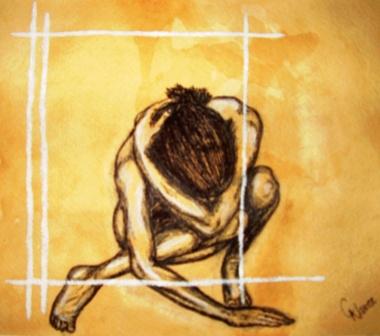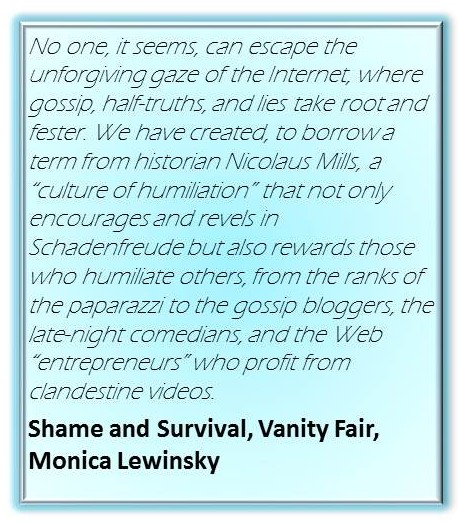After my last blog on the importance of speaking out about being scammed, I wanted to talk more about how Shame operates to keep us quiet, and the need to step out from behind shame.
Shame is one of the biggest factors that stops us talking about what has happened to us. It operates in several ways in romance scams, once we realise this is what has happened to us.
Firstly, we are ashamed of our own ability to not see through the scammer, because we have believed in their words and promises. We have thought we had something ‘special’. There is a societal expectations that we should be an effective judge of character and on this occasion we have been found wanting. We feel shame because we are not whole, we are deficient in this way because we do not have this skill. Because of this we do not deserve respect from others, and more painfully, we also no longer respect ourselves. We do not trust our own feelings, as a basis for action. Any trust in ourselves is broken. This is congruent with the definition given by Brené Brown, a leading exponent on shame mechanisms, who says a feeling of shame implies that we are a bad person, compared with a feeling of guilt, which points to a bad action or behavior.
Secondly, we feel shame because we have not had the security of our money as the highest motivation. Our western capitalist societies value financial security and rationality above all else, especially above love, which is seen as irrational. In this instance we have gone against this societal norm and given away our money because of love. Many of us who have done everything to assist our ‘loved one’ [the scammer] financially, have seriously and detrimentally damaged our own financial standing in the process, creating:

- loss of security such as housing, now or future;
- Loss of other valuables, assets, and ability to support ourselves into the future
- loss of savings that we have work hard for years for;
- increased credit through credit cards, loans, mortgages;
- and at times, illegal activities such as stealing or using money that we are not entitled to use.
In some cases, it may be impossible to recover financially from these losses, and these losses may cause further financial detriment such as additional taxes or loss of credit ratings or bankruptcy.

Thirdly, shame is generated by the fear of being publicly humiliated. As Monica Lewinsky has highlighted in her recent essays and TED talk on the Price of Shame, the internet as a tool for humiliation is very strong, and its power enormous, to reinforce our societal view of what we have done wrong, no matter how incorrect it is.
I have experienced this directly, in the Facebook comments to the exposé that I participated in on A Current Affair, and more recently, in comments attached to an article in the Daily Mail. In reading the comments you will see many people saying the comments below. These comments hurt, because they do not reflect an understanding of the situation, which can be seen from my responses to the comments.
- “How could she be so stupid”
(I wasn’t stupid, I was deliberately targeted by professional, manipulative and skilled fraudsters who have honed their skills by doing it thousands, perhaps millions of times. These skills include the “same type of mind control techniques used by cult leaders and domestic and dating violence perpetrators”[i]. I did not know I was being lied to and my feelings manipulated.) - “Hasn’t she heard all the warnings”
(No. I was never interested in online dating before, so was not aware of the warnings. I did not even know there was a need for warnings. When I was warned, I was already ‘hooked’ in the relationship, and the scammer encouraged me to disassociate with those who were warning me.) - “How could she give money to someone she has not met”
(This was someone [the scammer] who had built up such a degree of intimacy with me that I had agreed to marry him. This was not done lightly. I felt I had met and got to know him, so this premise is incorrect. Even though I had not seen him, I had talked incessantly with him. It is not like I was giving money to someone off the street that I had not met before.)
My understanding of the motives behind these comments is that evidence of being caught in a scam highlights a potential vulnerability that we all have, but don’t like the prospect of. Making the comment pushes this fear away from ourselves, with a haughty declaration of “It would never happen to me” that clearly sets THEM, the invincible ones apart from US , the ones who get conned and scammed. So it’s a separation defensive mechanism through creating superiority. Whilst I understand the mechanism impacting those who comment, the victim’s fear of public reaction and ridicule especially when not feeling strong in ourselves, makes us feel doubly ashamed.
Lastly, any research we do into scams tells us that we are unlikely to be able to do anything to get our money back, so we are unable to rectify the situation, to make it right again, to get retribution, to apportion blame where it should reside, with the scammer. In this we are powerless, and the lack of control we have mirrors the lack of control we had to be rational in the first place within the scam. We are again ashamed that we cannot now ‘fix’ or redress the situation. This powerlessness is in contrast to the multitude of TV shows that portray the criminal being caught and punished.
All of these mechanisms of shame coalesce when we realise we have been scammed, so it is not surprising that being scammed not much talked about, at least in an open exploratory way. Scams are talked about to shock people into taking more precautions, but for us this is too late.
Brené Brown[ii] says that there are 3 things which allow shame to exist: “Secrecy, Silence and Judgement”. All of these are in operation, in fact they spiral together when we realise we have been a victim of a romance scam. Its no wonder that people do not report scams, and do not tell family and friends about it either.
Nicholas de Castella comments about shame:
Shame is an emotion. It is the sadness (energy of loss) in which we feel that we are wrong, bad, flawed or invalid. A common reaction to feeling shame is to tighten our bodies, leaving us feeling numb, blank and unable to respond. This is a collapse of being into virtually non-emotional existence. Our right to ‘be’ is invalidated – challenging our right to: have an experience, to have an opinion, to have a feeling, to have an existence.[iii]
The experience of shock and shame you feel when you realise you have been scammed is truly debilitating for the victim.
In my next Blog, I will talk more about how to come out from behind the shame and become a survivor.
[i] Soraya Grant, Scams of the Heart blog, Thursday, July 11, 2013, What Not to Say When a Friend Has Been Scammed. http://scamsoftheheart.blogspot.com.au/2013/07/what-not-to-say-when-friend-has-been.html
[ii] Brené Brown on Oprah Life Class The 3 things you can do to stop a shame spiral. http://www.oprah.com/oprahs-lifeclass/Brene-Brown-on-the-3-Things-You-Can-Do-to-Stop-a-Shame-Spiral-Video Also in her books and TED talk.
[iii] The Anatomy of Shame by Nicholas de Castella http://www.eq.net.au/wp-content/themes/emotional/pdf's/AnatomyofShame.pdf Institute Of Heart Intelligence, www.eq.net.au


Don’t put yourself in this position. When there is a spark, before you fan it, find out who you are really dealing with.